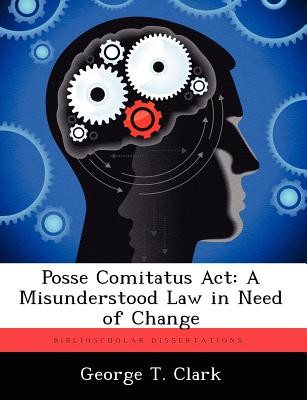
- We will send in 10–14 business days.
- Author: George T Clark
- Publisher: BiblioScholar
- ISBN-10: 1249592968
- ISBN-13: 9781249592969
- Format: 18.9 x 24.6 x 0.2 cm, minkšti viršeliai
- Language: English
- SAVE -10% with code: EXTRA
Reviews
Description
The Posse Comitatus Act (PCA), which is quoted above, is a long standing and often misunderstood bedrock of US domestic policy. A more thorough understanding of the law would alleviate much of the misunderstanding and the few limitations placed upon the military. It seems that every 4-5 years the US Congress has a debate about expanding or changing the law to allow the military to perform more domestic functions. This has occurred throughout the history of the United States. Most recently, it occurred in the '90's, with the "war" on drugs, when the military was used to monitor the US-Mexico border. It occurred during the response to Hurricane Hugo in the US Virgin Islands, during the Los Angeles riots and in the law enforcement investigation trying to catch the Washington, DC area sniper. Each time, there is much debate and discussion about the appropriate use of the military and how it can or cannot be used to help in such endeavors. This discussion inevitably focuses attention on the PCA and the limitations imposed upon the use of the military. Many view this legislation as a major barrier to the use of the military in most, if not all, parts of domestic action. However, this is simply not the case. The military is used everyday in a plethora of domestic activities that fall within the legal bounds of the PCA.
EXTRA 10 % discount with code: EXTRA
The promotion ends in 23d.00:54:13
The discount code is valid when purchasing from 10 €. Discounts do not stack.
- Author: George T Clark
- Publisher: BiblioScholar
- ISBN-10: 1249592968
- ISBN-13: 9781249592969
- Format: 18.9 x 24.6 x 0.2 cm, minkšti viršeliai
- Language: English English
The Posse Comitatus Act (PCA), which is quoted above, is a long standing and often misunderstood bedrock of US domestic policy. A more thorough understanding of the law would alleviate much of the misunderstanding and the few limitations placed upon the military. It seems that every 4-5 years the US Congress has a debate about expanding or changing the law to allow the military to perform more domestic functions. This has occurred throughout the history of the United States. Most recently, it occurred in the '90's, with the "war" on drugs, when the military was used to monitor the US-Mexico border. It occurred during the response to Hurricane Hugo in the US Virgin Islands, during the Los Angeles riots and in the law enforcement investigation trying to catch the Washington, DC area sniper. Each time, there is much debate and discussion about the appropriate use of the military and how it can or cannot be used to help in such endeavors. This discussion inevitably focuses attention on the PCA and the limitations imposed upon the use of the military. Many view this legislation as a major barrier to the use of the military in most, if not all, parts of domestic action. However, this is simply not the case. The military is used everyday in a plethora of domestic activities that fall within the legal bounds of the PCA.


Reviews